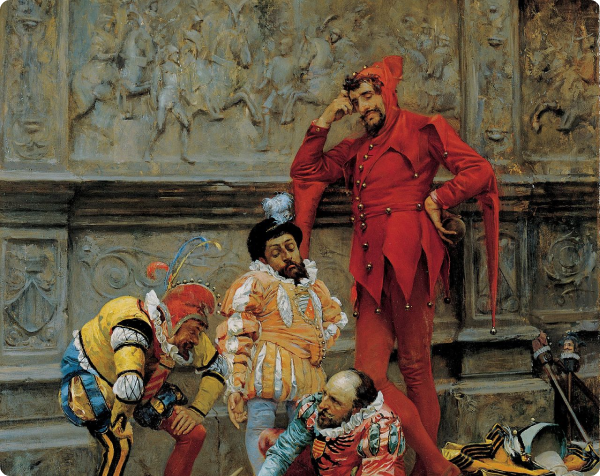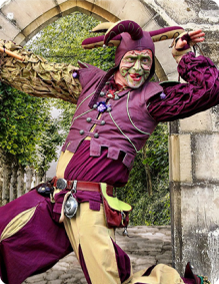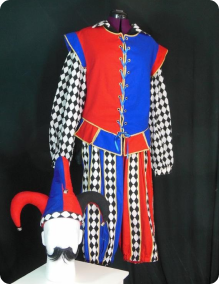Jester Etymology
Recent examples of the jester can include clowns or street performers, but what are the origins of the court fool? Jesters have had a long and vivid history that spans across the globe.
Origins of the English Word Jester
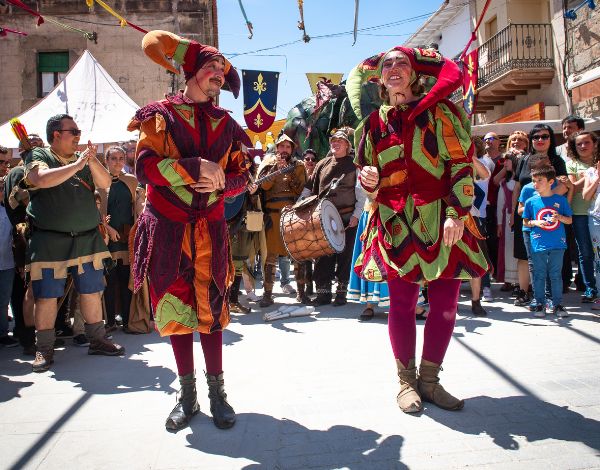
If you look in any dictionary, you will find a jester described as a fool who aimed to amuse people often through songs, dance, music, and jokes.1 However, there is more to the jester than just being a simple entertainer.
Common synonyms for the jester include buffoon, clown, joker, comedian, fool, harlequin, and minstrel. History will show that they were remembered for their wit and ability to make even the king laugh at their jokes.
While jesters were found world-wide throughout history, the English word ‘jester’ itself wasn’t used until Tudor times in the 16th century. The origin of the word finds its roots in the French Anglo-Norman word for ‘gestour’, a figure who was usually a minstrel or a professional reciter of romances and stories. Previous to the word jester becoming well used, figures in this role were typically dubbed fools or buffoons.
Additional terms the professional fool was also known for, was a joculator or juggler. This was an entertainer who would travel during the Middle Ages and perform tumbling, juggling, or dancing for festivals, taverns, or even the medieval court.
Other Names For Jesters
Fool, clown, buffoon, trickster, there was more than one name for the colourful figure of the jester throughout history. 2 From modern interpretations to the historical court jester, find out what’s behind the name of jesters.
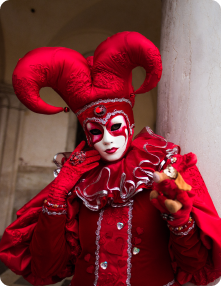
Jester Images
From the classic monk’s cowl hood to the Italian Commedia dell’arte mask, jesters have left a memorable image throughout history. Take a look at our gallery of paintings, photographs and modern interpretations to learn more about the jester.
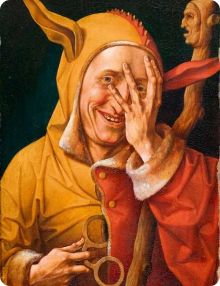
What it means to be a Court Jester
During ancient Rome, there are early accounts of comedic actors that began to pave the way for the role of the court jester. While the Romans never classified these figures as jesters, they fall under similar definitions and began the trend for these entertainers as a part of court life.
In the Middle Ages, the court jester became a common figure who entertained the reigning monarch. It was during these times that you might find jesters of vastly different backgrounds. A jester could be either a figure who travelled from town to town with little money to spare, or they could be employed by a nobleman, duke or even prince.
With the rise of the term jester in the medieval court, there was also a division in the role. While some jesters were of quick wit and often had the ear of the king, the physical appearance of other jesters were reported as being deformed and treated as serf or servant with little respect.
Some of the most famous court jesters in the Middle Ages include Bowes Lyons, Jane Foole, Will Sommers, and the French jester Triboulet also known as Nicolas Ferrial.
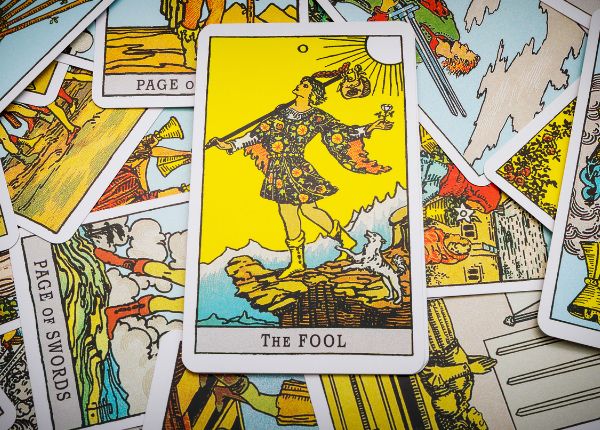
Jester etymology and symbolism throughout literature depicts the figure as a totem for honesty and quick wit. Most notably this is seen in Shakespeare’s King Lear, where the jester is seen mocking the monarch without any restrictions or repercussions.
What made the character of the jester or fool so popular during these times was their ability to outwit those usually in a higher seat of power. For this reason, the jester became a well-loved symbol for Shakespeare. In both literature and theatre everyone from the peasants to even Queen Elizabeth I loved the role of the jester.
The Latin word ‘follis’ meaning fool, also connects another form of symbolism to the jester. In Tarot, the card of ‘The Fool’ shows a person with a white rose, typically with a cat or dog following them towards a cliff. This card references luck, new beginnings, free-spirited nature, and opportunity.3
The evolution of the jester has become what we know as current day clowns, magicians, and street performers.4 This branch of the jester family tree carries on the traditions of the jester with a few changes.
The etymology behind the word clown is thought to come from the Scandinavian language, meaning clumsy or lout.
This depiction of the modern buffoon or fool has transformed the role of the jester from a figure who once had the ear of kings to someone who you will find performing at a birthday party.
While the act of the jester has changed its style through the years, the symbolism, and anecdotes of the fools’ lives on. From being the only person who could cheer up an angry king, to the travelling jesters who lived a life of adventure, the jester is a role that history will remember fondly.

Image credit text
Resources:
- “Jester.” Merriam-Webster.com Dictionary, Merriam-Webster, https://www.merriam-webster.com/dictionary/jester.
- “Synonyms of ‘Jester’ in British English.” Collins Dictionary, 2024, www.collinsdictionary.com/dictionary/english-thesaurus/jester.
- Biddy Tarot. “The Fool Tarot Card Meanings | Biddy Tarot.” Biddy Tarot, 24 July 2024, biddytarot.com/tarot-card-meanings/major-arcana/fool.
- “Clown | Definition, History, and Facts.” Encyclopedia Britannica, 16 July 2024, www.britannica.com/art/clown.

